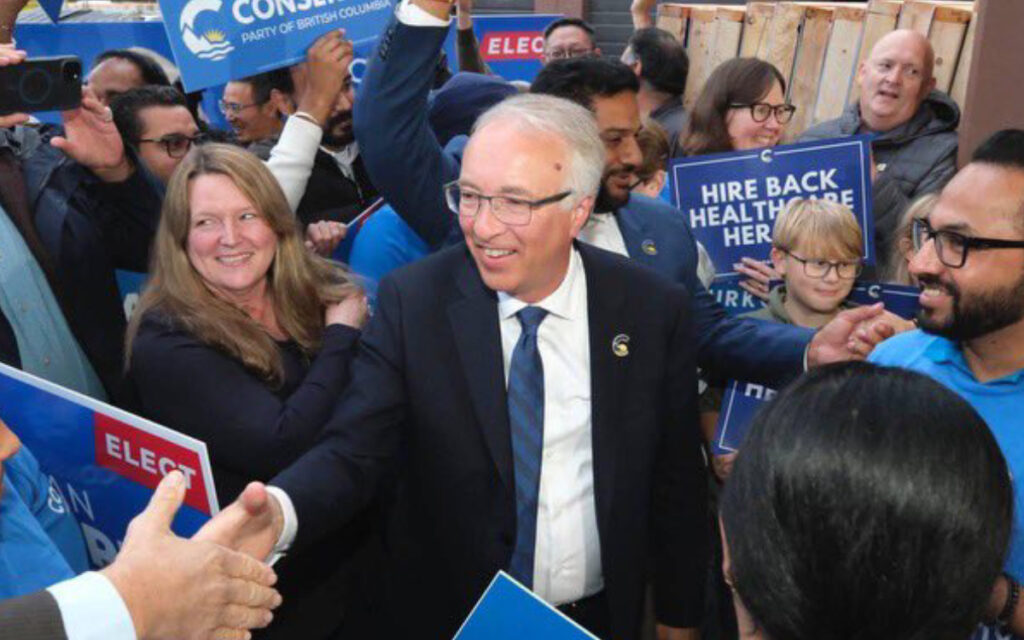
Election campaign signals a shift toward pragmatic policy discussions as voters focus in on affordability and crime. Pictured: B.C. Conservative Leader John Rustad. Photo Credit: John Rustad/X.
Last weekend, the provincial election in British Columbia kicked off in high gear. Voters will head to the polls on Oct. 19 to tick their ballots for candidates running for the incumbent B.C. NDP Party, the fledgling B.C. Conservative Party, or the B.C. Green Party, who, despite not picking up many seats in previous elections, have managed to play an outsized role in holding the balance of power.
With just over three weeks left on the clock, campaign announcements from the major parties have been rolling out the door, with a focus on hot button issues like housing, affordability, addiction and recovery, and healthcare.
It’s no surprise that the issues on the ground in B.C. closely align with the mood of the country from a federal perspective. One key takeaway however, in these early days of the campaign, is just how much the political priorities have changed since British Columbians last headed to the polls in 2020.
Four years ago, then-Premier John Horgan called a snap election during the early days of the COVID-19 pandemic and rode a wave of cross-Canada goodwill towards incumbent leaders straight to re-election.
At the time of the election call, Horgan’s focus was on reassuring British Columbians that the B.C. NDP were the political party best positioned to weather the province through the pandemic-era storm. His platform covered the bases. Funding for primary care and long-term care homes, a suite of COVID-19 relief measures, and environmental platitudes for reaching net-zero carbon emissions by 2050.
In a time of instability, voters wanted to stay the course. But things have taken a much different turn this go around. If the B.C. NDP are to win enough seats to form a government next month, they are in for a much tougher fight. Recent public opinion polling from Angus Reid shows that the outcome is in no way predetermined, and on core issues like economic growth and neighborhood safety, the B.C. Conservatives are the party most trusted.
Voters are looking for credible alternatives that can address their financial anxieties, whether that be lowering taxes or providing solutions to the housing change. It’s still too early to know whether the appetite for change will come to fruition, but the political messaging coming out of the B.C. NDP shows the party is trying to find its footing.
Take for example, Premier David Eby’s recent comments around the carbon tax. At a rally, Eby said, “I think it’s critical to also recognize that the context and the challenge for British Columbians has changed. A lot of British Columbians are struggling with affordability. If the federal government decides to remove the legal backstop requiring us to have a consumer carbon tax in British Columbia, we will end the consumer carbon tax in British Columbia.”
Anyone with a rudimentary understanding of the political landscape in British Columbia understands what a major shift in position this is. B.C. was the first province to adopt a carbon tax, and for the most part, there has been broad-based support for the policy. The fact that yet another progressive premier is willing to throw the towel in on the carbon tax demonstrates just how much the voter consensus on the issue has crumbled.
Then there’s the issue of addiction and recovery. While Eby has criticized the B.C. Conservative Leader for his commitment to shut down supervised consumption sites, the Premier has pledged to focus efforts on providing involuntary care for those with severe addictions who are mentally ill. This move shifted a change in stance by Eby, and matched a similar policy put forward by Conservative leader John Rustad days earlier.
The provincial election in B.C. is one to watch for several reasons, but more than anything, it appears to be ushering in a new era of pragmatic policy discussions. Left-leaning parties like the B.C. NDP are having to shift their ideological positions to adapt to the very real concerns being levied at them by voters on issues like taxes, and crime and addiction.
Elections matter. Next month’s election will be a litmus test for political parties at the federal level who are determining the policy playbook they will take to voters.

Josie Sabatino is a Senior Consultant at Summa Strategies, focused on providing strategic insight and helping clients meet their objectives in an ever changing and complex political and regulatory environment. Prior to joining Summa, Josie spent nearly a decade in political communications and most recently served as the Director of Communications to the Hon. Erin O’Toole, former Leader of the Official Opposition.






